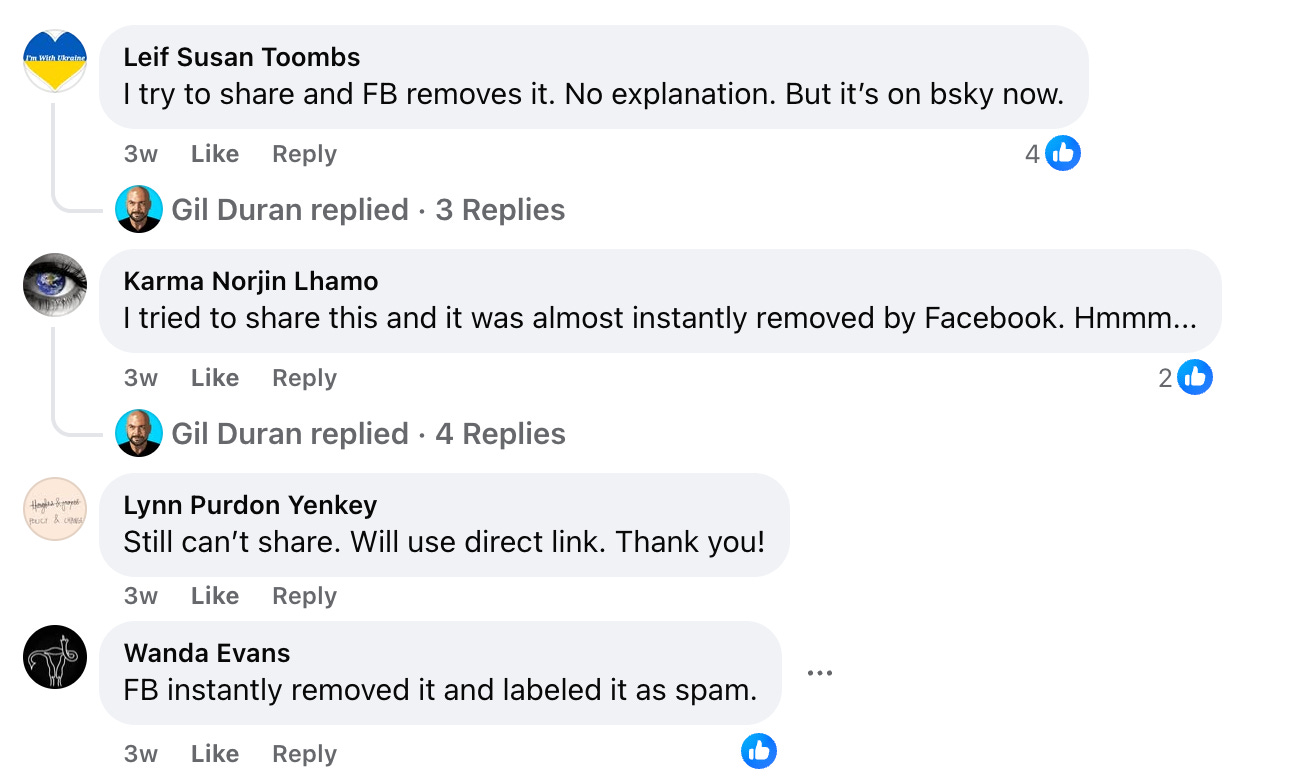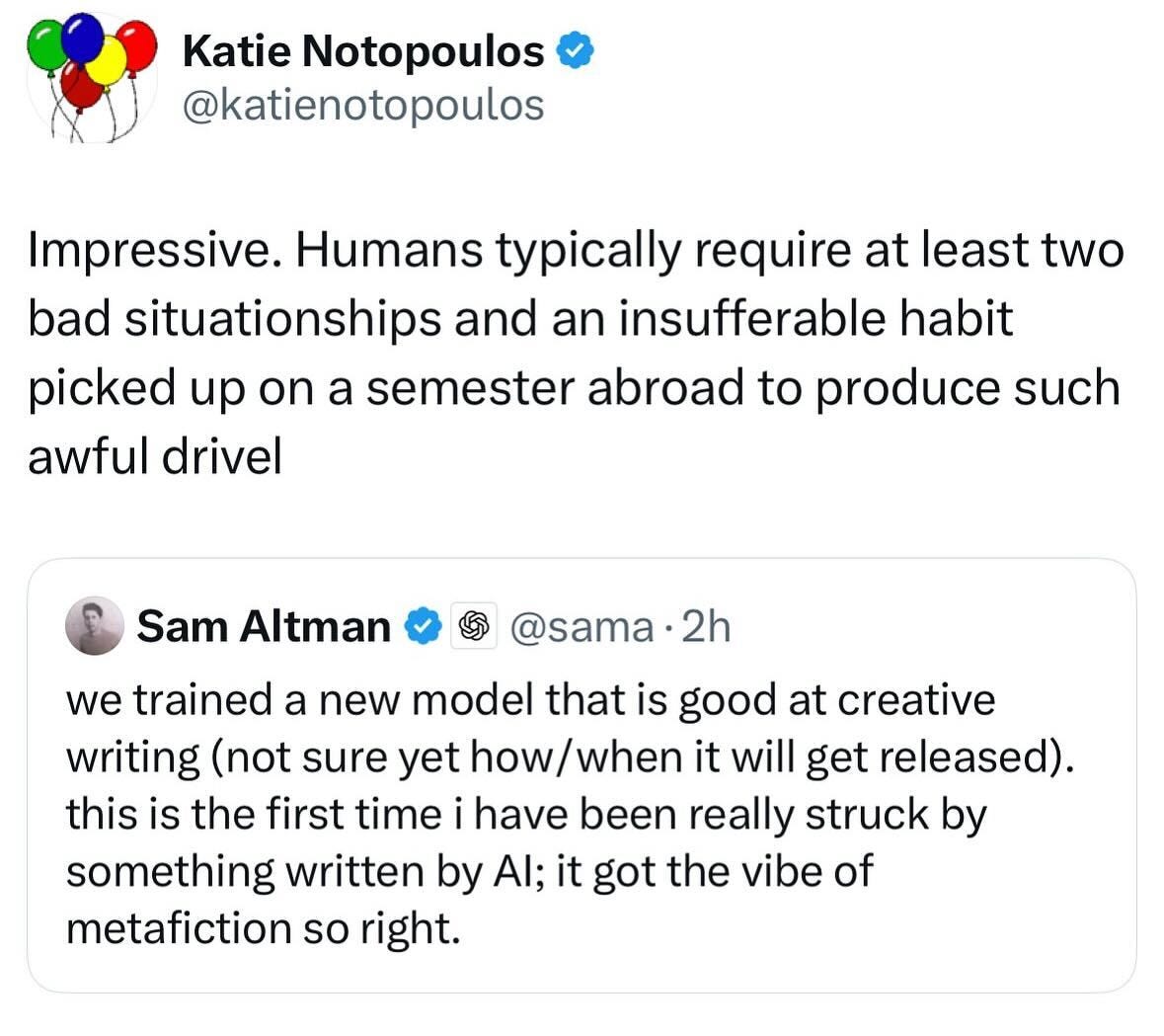Meta rep flagged 'critiques of tech industry figures' as 'sensitive or controversial content'
For weeks, Meta restricted the distribution journalist Gil Duran’s coverage of Elon Musk’s government takeover, preventing users from accessing and distributing an article published to his website and newsletter titled Memo: Capture of U.S. Critical Infrastructure by Neoreactionaries, by marking the article as spam.
The article details how a memo produced by a group of anonymous researchers does a good job of explaining Elon Musk’s “stunning takeover of the U.S. government” and how such a takeover is in line with Silicon Valley’s broader goals of establishing a “Network State.”
The Network State movement is a well-funded effort by Silicon Valley billionaires, including Marc Andreessen and Sam Altman, that seeks to create tech-controlled governments around the world. It’s a new, corporation-driven model of government, which does not function according to the laws of the U.S. or other nations. Instead of a government, citizens are controlled by a corporation, which can evade regulations, democracy, and laws.
Duran reports that Musk, who once declared, “government is the ultimate corporation,” is seeking to advance the Network State initiative through DOGE. “One way to establish a Network State is to build your own country somewhere and work with a host government to get rights to create sovereign territories,” Duran explained. “The other way to do it is to take over an existing government, which is what we see Elon Musk doing in Washington.”
Duran’s article lays out these initiatives in detail and explains how tech elites are working to replace democracy with corporate-style rule. “They haven’t dismantled the deep state–they’ve privatized it,” he writes.
When his readers went to share Duran’s article on Facebook, however, the link was removed as spam. Duran tried for weeks to get the issue resolved, convinced that it was some sort of benign error. He reached out to Meta support first on Facebook, then later on email.

Duran was told repeatedly by Meta’s Pro Team business support that his article was restricted because his website “addresses topics like the ‘Network State’ concept and critiques of tech industry figures… Meta may flag such content as sensitive or controversial, leading to restrictions.”
Duran tried to explain his background and credentials as a journalist to Meta, and reiterated that his article didn’t contain any violative content. On Sunday, the link was no longer being removed as spam but instead, users who posted the link had the article shadow banned. Duran even tried to purchase an ad through Meta’s ad network but the add did not seem to receive distribution.
On Tuesday, a Meta representative said that the restrictions on Duran’s article were a mistake and that the Meta representative misspoke. “Mr. Duran should never have received this response since it is factually inaccurate and does not reflect Meta’s policies,” a Meta spokesperson said. “This URL was mistaken as spam by our systems but has now been restored. This type of over-enforcement is exactly why we announced in January that we are working to take steps to reduce mistakes and simplify our systems to restore free expression.”
Duran said that he doesn’t believe that Meta is being fully forthright into their explanation. “I’m grateful that the Meta support person gave me such a forthright and clear answer,” he said. “Meta says it’s a mistake, but they can’t explain why a third party vendor would be under the impression that it would be completely legitimate to restrict an account because it criticizes tech billionaires.”
“There’s a lot missing in their explanation as to why my [article] would be classified as spam,” he added. “Most of Facebook is spam. It’s AI generated stuff getting 20,000 shares, it’s 75% fake news. Facebook pretends to have standards [when it’s convenient], but clearly there’s a lot they need to explain.”
“There’s no reason why criticizing tech billionaires or writing about the Network State should in any way trigger a restriction. I think that this opened a window into their very strange and opaque processes,” he said. “Disinformation is a major part of the Facebook brand,” he added. “I trust a working person trying to do a job more than some corporate gobledy gook.”
When Duran posted about the mishap on Bluesky, he was met with a flood of responses. “Censorship is explicit,” one user posted. “This is actually kind of scary,” another user said. People suggested suing the company and claimed this incident was further proof that Meta still censors too much speech.
As the Trump administration and other tech billionaires seek to crack down on speech and roll out mass censorship policies while hypocritically using the language of “free speech,” users are increasingly worried. Even minor incidents like this one can rapidly escalate, fueling allegations of platform bias.
Meta has traditionally been one of the most restrictive platforms when it comes to speech, and many worry that Zuckerberg, like other billionaires, is using the language of free speech publicly while arbitrarily limiting words and topics on the back end. “For these billionaires, free speech means we’re going to control the narrative,” Duran said.
Several billionaires and powerful political figures have begun pushing for censorship under the guise of “free speech.” Musk, for instance, while claiming to transform X into a “free speech haven,” has restricted the use of words like “cisgender,” downranking and punishing creators who use the term or speak about LGBTQ rights. He has permanently banned journalists and researchers who have reported critically on him, artificially inflated his own content in the feed, and Twitter has also complied with government censorship requests around the world.
Jeff Bezos, while claiming to champion unbiased journalism and free expression, has sought to tighten editorial control over The Washington Post. Journalists who espouse progressive ideologies have been pushed out of the paper, and, last month, Bezos mandated that the Post’s opinion section align strictly with themes of “personal liberties and free markets,” sidelining any dissenting viewpoints. WaPo opinion editor David Shipley resigned over this directive, raising concerns about the erosion of journalistic independence. Patrick Soon-Shiong, the billionaire owner of the L.A. Times has made similar efforts to exert control over the editorial coverage of his paper.
Duran’s issue with Meta also comes at a time when Silicon Valley is closer than ever to achieving their Network State goal. On Friday, WIRED reported that several groups representing “startup nations” aka Network State initiatives abroad that are “exempt from taxes and regulations that apply to the countries where they are located” were drafting Congressional legislation to create “freedom cities” across the U.S. that would no longer be subject to certain federal laws.
According to interviews and documents viewed by WIRED, these cities would be Network State-style zones within the U.S., where corporations and executives can do things like build constriction projects without having to obtain certain approvals, or run clinical trials and advance nuclear reactor startups, without having to get authorization from federal agencies.
Duran produced an excellent Network State series for the New Republic last year, which outlines the movement’s efforts in detail. Watch my interview with Gil Duran about the “Network State” movement from last June:
User Mag is a 100% reader-supported publication. To receive new posts and support my work, become a free or paid subscriber.
The MD Foodie Boyz did the rounds at Barstool

The MD Foodie Boyz, the hottest middle school podcast, met up with Dave Portnoy and did a whole tour of the Barstool podcast network. I was the first person to interview them back in February :).
User Mag is a 100% reader-supported publication. To receive new posts and support my work, consider becoming a free or paid subscriber.
What I’m reading
Harassment, Stalkers, Death Threats: A Day in the Life of Women on Twitch
Valkyrae, Cinna, and Emiru were threatened on a livestream — but they’re not the only women dealing with constant harassment. — Rolling Stone
Richard Florida Wants to Talk About the “Creator Economy”
The urbanist and educator thinks cities still don’t understand the importance of what the digital creative class does. — Common Edge
Democrats Have a New Game Plan: Yak It Up About Sports
Liberal leaders are flocking to sports radio shows and podcasts in a desperate attempt to reach young men who have tilted toward President Trump. — NY Times
To Get Big in China, N.B.A. Stars Enlist Social Media Surrogates
Companies like East Goes Global manage accounts for N.B.A. players, expanding their reach, creating business opportunities and pushing for All-Star votes. — NY Times
User Mag news rundown

- Seafood towers are out, hot dog towers are in.
- In Sweden, Zyn is for girls.
- BlackBerry’s iconic keyboard patent has expired.
- The Technology Brothers, the hottest tech podcast in Silicon Valley, has launched TBPN, a daily three hour live show streamed on X.
- Abercrombie mini skirts are going for $400 on Depop.
- Spotify appears to have removed Andrew Tate’s “pimping hoes” class.
- WeWork’s Adam Neumann is quietly building a new media startup.
- The New Yorker has updated its copy desk rules for the internet age: “in-box” is now “inbox,” “Web site” is now “website,” “Internet” is now “internet,” and “cell phone” is now “cellphone.”
- Once you learn about Temu towers you’ll start to see them everywhere.
- The U.S. just launched an app for self-deportation.
A Trump official tasked with defending DOGE’s cuts posted fashion influencer videos with affiliate links from her office. Her posts were tagged #dcinfluencer. The most devastating part is that she only had 800 followers.

@getdressedwithmc - TikTok group The Elevator Boys have signed with CAA.
- Michelle Obama is launching a podcast with her brother Craig Robinson.
- i-D magazine is back, with Karlie Koss at the helm.
- Netflix signs a deal with comedian Tony Hinchcliffe who performed at Trump’s Madison Square Garden rally.
- A Vermont cop ran over and killed a cyclist because he was watching YouTube on his giant car dashboard TV.
- Allure launched a newsletter on Substack called The Beauty Chat.
- West Virginia football coach bans TikTok dancing.
- Ross Andersen at The Atlantic argues that the Royal Society should kick out Elon Musk.
Sam Altman says OpenAI trained an AI model that is good at creative writing and shared an absolutely unhinged short story it wrote.

- Music artist Ne-Yo shared a video introducing his four girlfriends, who he calls “the pyramid.”
- Interview magazine spoke to protestors calling for the release of Mahmoud Khalil.
- Gavin Newsom had Steve Bannon on his new podcast, after hosting white nationalist Charlie Kirk last week. Historic levels of misreading the moment.
- An extremely menacing TikTok.
- Great video on the rise of Gen Z Twitch star iShowSpeed.
- No—em-dashes are not a sign of AI.
- TikTok is rolling out a “wind down” feature that will spam users under 16 will full-screen messages and “calming music” in order to push them to log off after 10 p.m.
- Journalist Sophia Smith Galer announced has secured funding for Sophina—an AI-powered tool that helps experts create journalistic video explainers.

For more User Mag follow my meme page and subscribe to my YouTube channel. You can buy me a coffee here.
Listen to my podcast Power User on Apple Podcasts:
Or follow Power User on Spotify:
